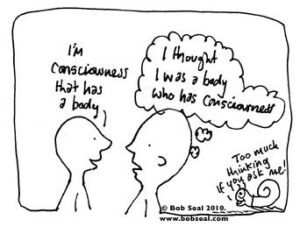 This column has been republished with permission from Vox Fairfax.
This column has been republished with permission from Vox Fairfax.
Do not pity the masses. Rather, exercise some sympathy for them as they attempt to sort through their daily lives while politicians – elected and campaigning – issue barrages of promises, criticisms, and non-answers to questions. With just a smattering of reflection, the separate universe cultivated by politicians may be withering away like the dictatorship of the proletariat.
In philosophy, dualism relates to distinguishing between mind and body, or subject and object, to identify the likely or reliable truth of competing propositions. In 1637, Rene Descartes coined his principle of inquiry as “Cogito ergo sum” meaning “I think, therefore, I am.” The French philosopher sought to parse cognition, concluding that doubt concerning the world around us results in reasonably reliable conclusions.
Nationwide, Republicans are spearheading efforts to rid state electoral systems of fraud and theft of elected offices. The evidence to support those efforts is sparse to nonexistent, yet the campaigns and promises and criticisms continue. This phenomenon is no less true in Virginia, where Governor Youngkin adopted “election integrity” as a campaign plank. His popular vote margin to victory was 63,688 – 0.0195% – out of 3.262 million votes cast.
The Cartesian principle argues that election integrity in light of these data leads to a conclusion that the winning results were either less than integral or insufficiently wide in their favor to be credible. In addition, the turnout in 2021 was the highest in the Commonwealth’s history (or maybe not?) as pundits attributed some of that result to expanded voter access, especially early, no-excuse voting. Superficial cogitation ordinarily would lead an observer to conclude that the resurgent Republican party in Virginia was now poised to undertake reforms to increase voter turnout while ensuring that the integrity that apparently was not violated in 2021 is enhanced.
Unfortunately, that sum of thought would be incorrect. Cartesian analysis also applies to the subject-object dichotomy whereby the masses of voters are deemed to be simultaneously both, mere captives of the elected class. Governor Youngkin never clarified the integrity term, leaving that bit of divisiveness to legislative allies.
His major contribution to the integrity mantra has been the replacement of the state’s head of the Department of Elections, an action unsupported by any reference to improving election integrity.
During interviews on the campaign trail, candidate Youngkin advocated distancing the Department of Elections from the governor’s office without offering any details, increased voter photo ID requirements, and audits of voting machines to ensure public trust. As a matter of standard practice, voting machines in Virginia are subjected to audit after elections. The message seems to be intended to muddle voter comprehension about the notion of election integrity as the subject-object masses. Or, it reflects the cognition of the new governor.
Meanwhile, the General Assembly lurches toward the close of its current session with bombardments of bills up and down committees and subcommittees and in the “crossover” channels in the hopes of the survival of some in a fiercely partisan arena. Youngkin legislative allies patroned legislation to reduce early voting from 45 to 15 days and ban absentee ballot drop boxes, measures inexplicably entwined with integrity. Election integrity advocates also sponsored legislation to cancel same-day voter registration, scheduled to commence this November. Curiously, a bill was also introduced to permit voters to “self impose photo ID” at polling stations. At present, a voter without photo ID may sign an affidavit.
In a truly bizarre bit of Orwellian newspeak, House Republicans proposed to slash $2.7 million from the budget of the Department of Elections slated for voter education, a program to dispel misinformation about the integrity of the state’s elections arising from the 2020 election.
It’s possible sponsors believed the project was a deep state conspiracy by Democrats to sustain further criticism of the Big Lie. Educating and informing voters is counterproductive to sustaining political dualism among the masses. On the other hand, at the same time, the loss of the funds would deprive Youngkin’s new agency appointee of calibrating a different message about election integrity. Here the evidence suggests a right hand-left hand dissociation. All of this is migraine puzzlement.
Nonetheless, as subject-object constituents of the Commonwealth polity, the electeds require that thinking leads to self-identification which, in turn, leads to credible criticism of political dynamics. Encouraging disorganized thought processes is characteristic of politicians to suppress cognition by voters and any realization that they are the reason for the existence of a polity.
An example of political self-delusion was recently expressed by Delegate Margaret Ransone, R-Westmoreland, who announced in justifying a vote to kill campaign finance reform that she could not in good conscience support a piece of legislation that was not perfect. Ms. Ransone offered no suggestions on measures to make the legislation perfect.
We think, therefore, we are. It may take more time, but dualism of the universe promoted by politicians to ensure their permanence in the relationship is eroding. What we are and think is producing reliable conclusions that diminish expediency and hollow rhetoric as coin of the realm. No longer merely a dime a dozen, politicians are morphing into non-fungible tokens (NFTs in crypto language), existing solely in a blockchain in cyberland.


